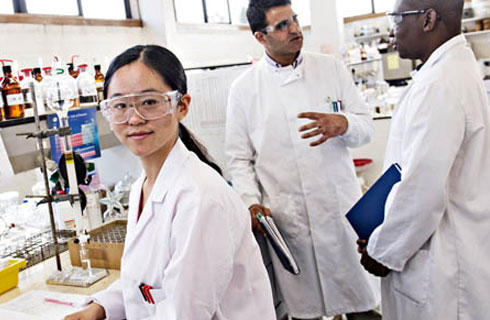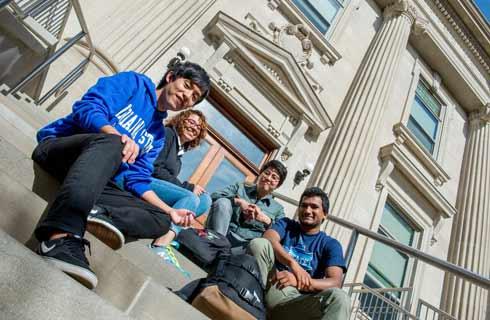荣誉免疫学理学学士
Honours Bachelor of Science in Immunology - St. George

学历文凭
Bachelor Degree with Honours

专业院系
Faculty of Arts and Science

开学时间

课程时长

课程学费

国际学生入学条件
- Biology (SBI4U)
- Calculus & Vectors (MCV4U)
- Chemistry (SCH4U)
- English (ENG4U)
- Physics (SPH4U) is recommended or equivalent qualifications
IDP—雅思考试联合主办方

雅思考试总分
6.5
- 雅思总分:6.5
- 托福网考总分:89
- 托福笔试总分:160
- 其他语言考试:Pearson Test of English (PTE) Academic - Overall score of 65 with no part below 60.
CRICOS代码:
申请截止日期: 请与IDP联系 以获取详细信息。
课程简介
Immunology is an integrative branch of the medical sciences that draws upon the more traditional disciplines of Molecular Biology, Microbiology, Pathology, and Biochemistry. In essence, Immunology is the study of the physiological responses that result when foreign (i.e., non-self) materials are introduced into a vertebrate organism such as humans. Traditionally, the discipline has focused on the body's response to infectious micro-organisms, with the purpose of developing effective vaccines. However, the scope of modern Immunology now encompasses all aspects of self vs. non-self recognition phenomena including organ transplantation, tumour immunology and autoimmune diseases. Recent major advances in our understanding of the cellular and molecular basis of the immune response promise to provide us with a new generation of prophylactic, therapeutic and diagnostic reagents of relevance to human and animal health.The Department of Immunology, in collaboration with Trinity College, co-ordinates specialist, major, and minor programs in Immunology. The emphasis of the specialist program is to provide students with a sound theoretical understanding of the cellular and molecular basis of non-self recognition, together with sufficient laboratory experience to enable the students to consider embarking on a career in the discipline. The major and minor programs offer students fundamental training in Immunology and gives them the opportunity to combine Immunology with another program in Life Sciences, Basic Sciences, or within the Arts.Immunologists may have careers in universities and other centres of learning and research, as well as in the biotechnology industries, diagnostic laboratories and various government agencies. Courses in this specialist program are drawn from offerings by the Department, together with courses from other Departments, taught in some cases by members of the Department of Immunology. As enrolment in the specialist and major programs are restricted, please consult specific requirements outlined in the program description section.
相关申请
 预科
预科 奖学金
奖学金 实习机会
实习机会 在校学习
在校学习 跨境学习
跨境学习 校园授课-线上开始
校园授课-线上开始 在线/远程学习
在线/远程学习
开学时间&学费
学费信息仅供参考,请与IDP联系以获取详细信息
| 开学时间 | 时长 | 学费 | 地点 |
|---|
学校排名

世界排名21
数据源:
泰晤士高等教育世界大学排名
关于多伦多大学

多伦多大学(University of Toronto),始建于1827年,坐落在加拿大的第一大城市多伦多,是加拿大的一所顶尖学府,亦为加拿大传统四大校之一。安大略省政府及议会环绕在市中心的女王公园四周,现已发展成为一所“一主两翼”格局的世界知名研究性大学--坐落于市中心的圣乔治校区(St. George),历史最为悠久,与3个更小的大学联盟并有享有七大学院制,与十座教学医院有着密切关系;东西向延伸至世嘉堡与密西沙加,UTSC有着乡村般的风光,风景别致,搭乘TTC一小时路程;UTM则是在西边,有校车往返。在学术及研究方面,多伦多大学一直处于领先地位。其经费、捐款、国家教授奖项、研究出版规模和藏书量皆为加拿大之首。多伦多大学出版社在加拿大乃至全北美影响深远。实行独立书院制的学府,荣获诺贝尔奖的教授人数是加拿大最多的。维多利亚学院是其最富有的学院之一 提供更多奖学金和相关设施。多伦多大学亦为美国大学协会中仅有的两所非美国学府之一。多伦多大学每年发表的科研论文数量在北美仅次于哈佛大学,引用数量位居世界前五。主要贡献:干细胞及胰岛素的发现,电子起搏器、多点触摸技术、电子显微镜、抗荷服的发明和发展,NP完全理论,以及发现首个经核证的黑洞。
本校相关课程
其他相关课程

Doctor of Philosophy in Microbiology and Immunology
 普渡大学
普渡大学学历文凭
Ph.D.
开学日期
课程费用总额


Doctor of Philosophy in Immunology
 密歇根大学安娜堡分校
密歇根大学安娜堡分校学历文凭
Ph.D.
开学日期
课程费用总额


分子微生物学和免疫学哲学博士
 约翰霍普金斯大学
约翰霍普金斯大学泰晤士高等教育世界大学排名:16
学历文凭
Ph.D.
开学日期
课程费用总额


Doctor of Philosophy in Biological/Doctor of Philosophy in Biomedical Sciences - Immunology
 耶鲁大学
耶鲁大学泰晤士高等教育世界大学排名:10
学历文凭
Double Major Degree
开学日期
课程费用总额


生物医学和分子科学理学硕士-微生物
 女王大学
女王大学学历文凭
Masters Degree
开学日期
课程费用总额


Doctor of Philosophy in Immunology
 爱荷华大学
爱荷华大学泰晤士高等教育世界大学排名:342
学历文凭
Ph.D.
开学日期
课程费用总额
















